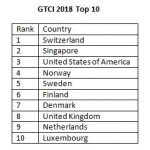Gaining access to the right talent is an imperative for most organizations. So the latest Global Talent Competitiveness Index should be of interest to most managers.
The index, which is now in its 5th year, is produced by INSEAD in partnership with Adecco and Tata Communications. It examines 68 distinct variables, from the amount of collaboration within organisations to the gender pay gap, from productivity to university rankings. These metrics are designed to formulate an overall ‘talent competitiveness’ score for a country, which illustrates the ability of the country to attract, develop and retain skilled workers.
 Top spot in the rankings is taken by Switzerland, followed by Singapore and the United States. The authors believe that Switzerland is especially strong due to its focus on cognitive diversity, with domestic talent retained whilst external talent attracted to the country. Indeed, 24% of the population was born abroad.
Top spot in the rankings is taken by Switzerland, followed by Singapore and the United States. The authors believe that Switzerland is especially strong due to its focus on cognitive diversity, with domestic talent retained whilst external talent attracted to the country. Indeed, 24% of the population was born abroad.
Growing talent
In terms of developing talent, the Netherlands scored highest in that regard, with the United States and the United Kingdom also scoring highly, due in large part to their high quality universities.
The report goes on to include specific detail around the cities that are especially attractive to talent. Of the 90 cities analyzed, perhaps unsurprisingly there is a strong correlation between the national rankings and the city rankings, with Zurich taking top spot, followed by Stockholm and Oslo.
It’s interesting to note the fall in performance by the UK, with Brexit adding a particular layer of uncertainty, especially around the ability to attract talent to the country in the wake of calls to reduce migration numbers.
“Despite Article 50 being officially triggered in 2017, the ongoing negotiations and continuing lack of clarity over the UK’s position once it leaves the European Union in 2019, means the impact Brexit will have is not yet clear. It is important that both businesses and the Government start preparing for different possible scenarios and keep the ability to attract and retain talent at the forefront of any strategy,” Adecco say.
The authors hope that the report will provide decision-makers in both business and government with a greater understanding of what drives talent competitiveness.
Specifically, it suggests that by creating a truly diverse and inclusive corporate culture companies can gain a competitive advantage that will enable them to not just better attract and retain talent, but create a high performing workforce.
GTCI 2018: TOP 10 COUNTRIES (2017 ranking in brackets)
| 1. Switzerland (1) | 6. Finland (9) |
| 2. Singapore (2) | 7. Denmark (8) |
| 3. United States (4) | 8. United Kingdom (3) |
| 4. Norway (10) | 9. Netherlands (11) |
| 5. Sweden (5) | 10. Luxembourg (7) |